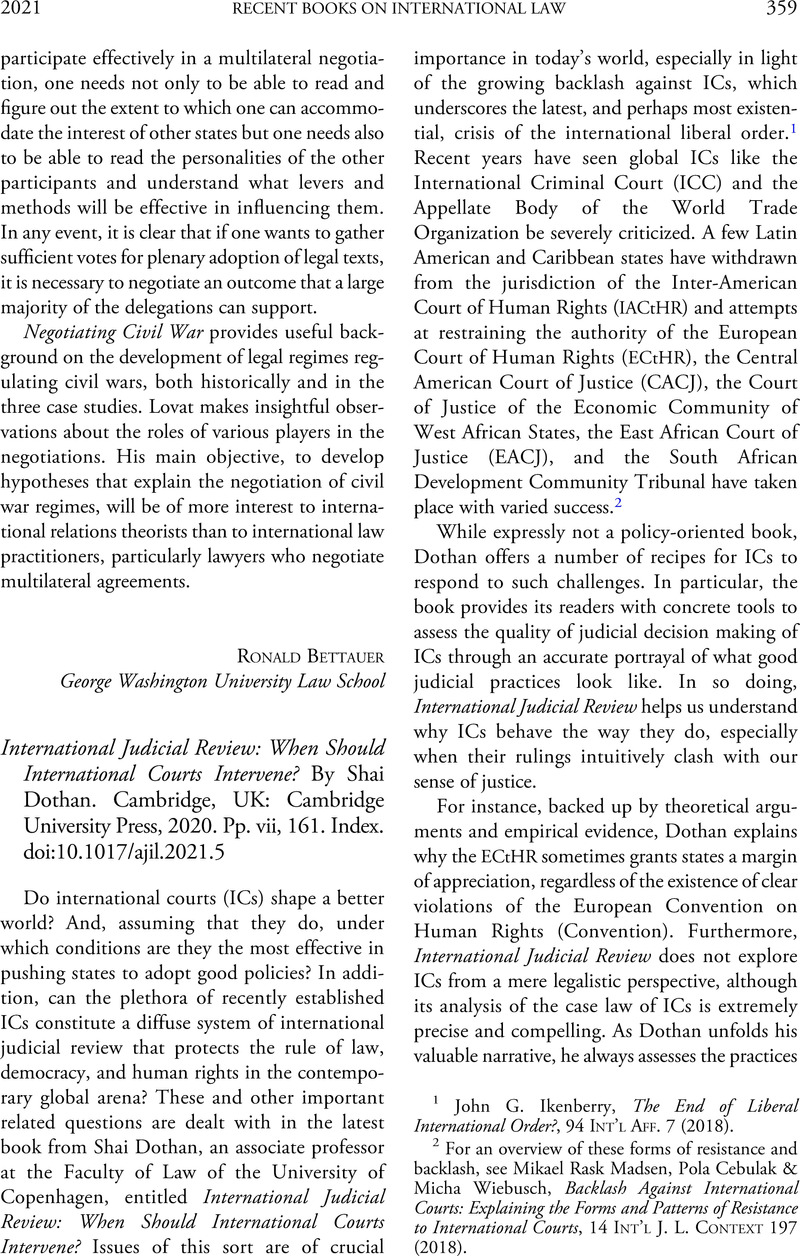No CrossRef data available.
Published online by Cambridge University Press: 19 April 2021

1 Ikenberry, John G., The End of Liberal International Order?, 94 Int’l Aff. 7 (2018)Google Scholar.
2 For an overview of these forms of resistance and backlash, see Madsen, Mikael Rask, Cebulak, Pola & Wiebusch, Micha, Backlash Against International Courts: Explaining the Forms and Patterns of Resistance to International Courts, 14 Int’l J. L. Context 197 (2018)Google Scholar.
3 Alexander Bickel, The Least Dangerous Branch: The Supreme Court at the Bar of Politics (1986).
4 Sunstein, Eric A. Posner & Cass R., The Law of Other States, 59 Stanford L. Rev. 131 (2006)Google Scholar.
5 Similar conclusions have been reached by scholars of resistance to ICs and by a number of sociologists focusing on conflict. See, e.g., Madsen, Cebulak & Wiebusch, supra note 2; Pierre Bourdieu, The Force of Law: Toward a Sociology of the Juridical Field, 38 Hastings L.J. 805 (1987).; Yves Dezalay & Bryant G. Garth, Dealing in Virtue: International Commercial Arbitration and the Construction of a Transnational Legal Order (1996).
6 Mikael Rask Madsen, Explaining the Power of International Courts in Their Context: From Legitimacy to Legitimization, 7 RSCAS Policy Paper (Courts, Social Change and Judicial Independence) 23 (2012); International Court Authority (Karen J. Alter, Laurence Helfer & Mikael Madsen eds., 2018).
7 Salvatore Caserta, International Courts in Latin America and the Caribbean: Foundations and Authority (2020).
8 David M. Trubek, Yves Dezalay, Ruth Buchanan & John R. Davis, Global Restructuring and the Law: Studies of the Internationalization of Legal Fields and the Creation of Transnational Arenas, 44 Case Western Reserve L. Rev. 407 (1994).
9 International Court Authority, supra note 6; Liesbet Hooge, Gary Marks, Tobias Lenz, Jeanine Bezuijen, Besir Ceka & Svet Derderyan, Measuring International Authority – A Postfunctionalist Theory of Governance, Vol. III (2017); Birgit Peters & Johan Karlsson Schaffer, The Turn to Authority Beyond States, 4 Transnat’l Legal Theory 315 (2013).
10 Karen J. Alter, The New Terrain of International Law: Courts, Politics, Rights (2013).
11 Mikael Rask Madsen, Sociological Approaches to International Adjudication, in The Oxford Handbook of International Adjudication (Cesare P.R. Romano, Karen J. Alter & Yuval Shany eds., 2013).
12 Antoine Vauchez, The Making of the European Union's Constitutional Foundations: The Brokering Role of Legal Enterpreneurs and Networks, in Transnational Networks in Regional Integration – Governing Europe 1945–83 (Wolfram Kaiser, B. Leucht & M. Gehler eds., 2010).
13 James T. Gathii, Mission Creep or a Search for Relevance: The East African Court of Justice's Human Rights Strategy, 24 Duke J. Comp. & Int’l L. 249 (2013).
14 Pablo González-Domínguez, The Doctrine of Conventionality Control – Between Uniformity and Legal Pluralism in the Inter-American Human Rights System (2018).
15 Salvatore Caserta, The Contribution of the Caribbean Court of Justice to the Development of Human and Fundamental Rights, 18 Hum. Rts. L. Rev. 170 (2018).
16 Salvatore Caserta, Regional International Courts in Search of Relevance: Adjudicating Politically Sensitive Disputes in Central America and the Caribbean, 28 Duke J. Comp. & Int’l L. 59 (2017).
17 Ginsburg, Tom, Authoritarian International Law?, 114 AJIL 221 (2020)CrossRefGoogle Scholar.
18 Ireland v. United Kingdom, App. No. 5310/71, 1978 Eur. Ct. H.R. 1 (Jan. 18, 1978).
19 Banković and Others v. Belgium and Others, 2001-XII Eur. Ct. H.R. 333 (Dec. 12, 2001).
20 Al-Skeini and Others v. United Kingdom, App. No. 55721/07, 53 Eur. H.R. Rep. 18 (July 7, 2011).
21 Al-Jedda v. United Kingdom, App. No. 27021/08 (Eur. Ct. H.R. July 7. 2011), 50 ILM 950 (2011).
22 Hirschl, Ran, The Judicialization of Mega-Politics and the Rise of Political Courts, 11 Ann. Rev. Pol. Sci. 93 (2008)Google Scholar.
23 Alter, Karen J., Who Are the “Masters of the Treaty”?: European Governments and the European Court of Justice, 52 Int’l Org. 121 (1998)Google Scholar.